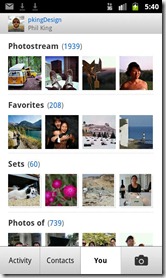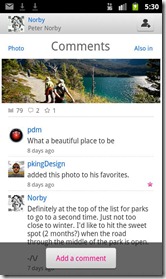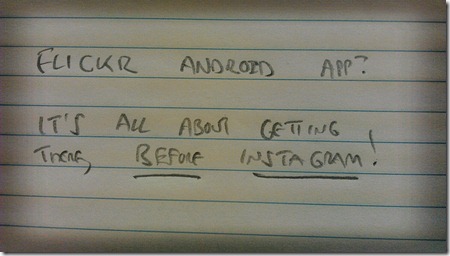Home » flickr
Category Archives: flickr
Digital Culture Links: May 21st
Links through to May 21st:
- Sensis Yellow Social Media Report 2013 [PDF] – The new Sensis Yellow Social Media Report is out (based on a survey of 937 Australians in March and April 2013), showing widespread social media use, with growth in mobile and second screen uses:
* 95% of AUstralian social media users use Facebook
* The typical Australian spends 7 hrs/wk on Facebook
* 67% of Australians access social sites on a smartphone
* 42% of Australians use social media while watching TV - A better, brighter Flickr [Flickr Blog] – Yahoo have majorly redesigned Flickr, giving new free (ad-supported) accounts 1Tb of storage, which is an awful lot of photos. The Android app is now almost identitcal to the iOS app, but the new aesthetics of the web-based version are a big change, looking more and more like every other photo-sharing service around today. Quite a few long-term Flickr users (of which I am one) have voiced a range of concerns about the design changes. Also, what this redesign means for people who’ve already paid for Pro accounts is deeply unclear on the main Flickr pages. (The Twitter account seems to suggest nothing changes.)
- Yahoo! to Acquire Tumblr / Yahoo [Yahoo News Centre] – Yahoo buys Tumblr for $1.1 billion and, in their words, “promises not to screw it up”. A clever buy for Yahoo, but it’ll be hard to integrate the rebellious/youth Tumblr userbase into the Yahoo brand.
- Introducing Photos of You [Instagram Blog] – Just in case you momentarily forgot that Facebook owns Instagram, the photo-sharing service has just added the ability to tag photos (remarkably similar to Facebook’s tagging function). Looks like Instagram needs a better map of your personal networks before they can harness it commercially.
- Follow the audience… [YouTube Blog] – May 2013 and YouTube users “are watching more than 6 billion hours of video each month on YouTube; almost an hour a month for every person on Earth and 50 percent more this year than last.”
Digital Culture Links: December 17th
Links through to December 17th:
- The Web We Lost [Anil Dash] – Spot on: “Facebook and Twitter and Pinterest and LinkedIn and the rest are great sites, and they give their users a lot of value. … But they’re based on a few assumptions that aren’t necessarily correct. The primary fallacy that underpins many of their mistakes is that user flexibility and control necessarily lead to a user experience complexity that hurts growth. And the second, more grave fallacy, is the thinking that exerting extreme control over users is the best way to maximize the profitability and sustainability of their networks. The first step to disabusing them of this notion is for the people creating the next generation of social applications to learn a little bit of history, to know your shit, whether that’s about Twitter’s business model or Google’s social features or anything else. We have to know what’s been tried and failed, what good ideas were simply ahead of their time, and what opportunities have been lost in the current generation of dominant social networks.”
- False Posts on Facebook Undermine Its Credibility [NYTimes.com] – A reminder that Facebook’s battle against fake accounts is all about the authenticity the SELL ADVERTISERS: “For the world’s largest social network, it is an especially acute problem, because it calls into question its basic premise. Facebook has sought to distinguish itself as a place for real identity on the Web. As the company tells its users: “Facebook is a community where people use their real identities.” It goes on to advise: “The name you use should be your real name as it would be listed on your credit card, student ID, etc.” Fraudulent “likes” damage the trust of advertisers, who want clicks from real people they can sell to and whom Facebook now relies on to make money. Fakery also can ruin the credibility of search results for the social search engine that Facebook says it is building. … The research firm Gartner estimates that while less than 4 percent of all social media interactions are false today, that figure could rise to over 10 percent by 2014.”
- Android overtakes iOS in Australian usage [Ausdroid] – December 2012: “Android has been growing globally at an extremely rapid rate with statistics from November indicating that Android currently enjoys a 75% market share. In Australia this year over 67% of Smart Phone sales were Android handsets and now research analysis firm Telsyte is advising that market penetration of Android devices in Australia has finally overtaken iOS with Android now on 44% of the 10 Million mobile phones currently in use here. iOS still enjoys a 43% market share …”
- Social Media Report 2012 [Nielsen] – Nielsen’s Social Media Report 2012 provides statistical evidence of the trends for 2012, which shows the internet use, mobile use and social networking time are all up. A third of people engaging in social networking “from the bathroom”!
- Text messaging turns 20 [Technology | The Observer] – “Long ago, back before Twitter, way before Facebook, in a time when people still lifted a receiver to make a call and telephone boxes graced streets where people didn’t lock their doors, Neil Papworth, a software programmer from Reading, sent an early festive greeting to a mate. “Since mobile phones didn’t yet have keyboards, I typed the message out on a PC. It read ‘Merry Christmas’ and I sent it to Richard Jarvis of Vodafone, who was enjoying his office Christmas party at the time,” said Papworth. On 3 December 1992, he had sent the world’s first text message. Text messaging turns 20 tomorrow. More than 8 trillion were sent last year. Around 15 million leave our mobile screens every minute. There is now text poetry, text adverts and text prayers (dad@hvn, 4giv r sins) and an entire generation that’s SMS savvy. Last week saw the first major act of the text watchdog, the Information Commissioner’s Office, in fining two men £440,000 over spam texts.”
Digital Culture Links: May 11th through May 21st
Links for May 11th through May 21st:
- It’s YouTube’s 7th birthday… and you’ve outdone yourselves, again [YouTube Blog]– On YouTube’s 7th birthday, they annouce 72 HOURS of video are being UPLOADED EVERY MINUTE!”Today 72 hours of video are uploaded to the site every minute. Like many 7 year olds around the world, we’re growing up so fast! In other words, every single minute you now upload three whole days worth of video instead of two. That’s 61 Royal Wedding Ceremonies, 841 Bad Romances, and 1,194 Nyan Cats.”
- Introducing the Knowledge Graph: things, not strings [Official Google Blog]– Google diversifies the sort of search results returned (initially in the US, but other countries to follow) along the lines of what they’re calling the ‘knowledge graph’ which appears to be an initial foray into indexing using semantics.
- The LEGO Gender Gap: A Historical Perspective [Thinking Brickly] – A detailed and thoughtful historical overview of gendered figures and advertising from LEGO. Well worth a read.
- How Yahoo Killed Flickr and Lost the Internet [Gizmodo] – The sad tale of Flickr’s purchase by Yahoo and decline from the greatest photo sharing community online in the world to whatever status it still has. A failure to embrace the mobile web (and a terrible app) along with a buy-out by a company that fundamentally doesn’t understand community are highlighted as the main culprits.
- COMPETITION: Thanking all our fans for 1 billion downloads [Rovio Entertainment Ltd] – Rovio announce that there have been one billion downloads of the Angry Birds games. That’s a lot!
Yahoo finally starting to ‘get’ Flickr with funky Android Weather app!
 Hot on the heels of their official Flickr app for Android, Yahoo have released a their unimaginatively titled Yahoo! Weather Android app, but behind the banal name are signs that Yahoo are finally starting to understand how the vast treasures of Flickr might integrate into a mobile media world. While this is a fairly simple idea – combining global weather data with matching photographs – it’s the sort of thing we’ve not seen from Yahoo in a long time. More to the point, the simple design actually houses a great weather app, and it’s free. Yahoo are probably paying a license to use the Weather Channel data, but the real riches are the Flickr photos which are all provided by users for free. That said, I don’t think this is exploitation: each photo comes with credit to the photographer (well, their Flickr username) and a link back to the original photograph. For most Flickr users, the exposure far outweighs any thought of payment, especially in a free app.
Hot on the heels of their official Flickr app for Android, Yahoo have released a their unimaginatively titled Yahoo! Weather Android app, but behind the banal name are signs that Yahoo are finally starting to understand how the vast treasures of Flickr might integrate into a mobile media world. While this is a fairly simple idea – combining global weather data with matching photographs – it’s the sort of thing we’ve not seen from Yahoo in a long time. More to the point, the simple design actually houses a great weather app, and it’s free. Yahoo are probably paying a license to use the Weather Channel data, but the real riches are the Flickr photos which are all provided by users for free. That said, I don’t think this is exploitation: each photo comes with credit to the photographer (well, their Flickr username) and a link back to the original photograph. For most Flickr users, the exposure far outweighs any thought of payment, especially in a free app.
Currently all photos are drawn from a specific purpose-driven Flickr group, so no one’s image will appear without them explicitly adding it to that group. However, there were just over 2500 photos when I looked this morning, so I guess a lot of the world isn’t covered yet. I’d suggest that in the next version, Yahoo make the most of those thousands and thousands of Creative Commons licensed images which folks have already explicitly given permission to re-use via their copyright license choice. Everything under a Creative Commons Attribution license, for example, would clearly be suitable for inclusion in the app. Given there are, literally, billions of Flickr photos, perhaps asking a whole lot of users to add specific photos to the Weather app group could broaden the potential photos rapidly.
It’s also noteworthy that Yahoo are focusing on Android apps right now. Rather than compete with the very entrenched iOS photo apps, Yahoo are courting Android users who’ve not really found their killer photo apps just yet.
Overall, though, it’s great to see Yahoo realising just how rich a resource Flickr can be for mobile apps. Flickr really is the jewel in Yahoo’s rusting crown, and if they can make it shine perhaps we’ll see the beginning of a fresh start for Yahoo, at least in terms of mobile development. This weather app just scratches the surface, but I suspect we’ll see tourism and other location-based apps quickly emerging, finally utilising the rich diversity of photos and metadata that constitutes the core of Flickr.
Digital Culture Links: October 17th 2011
Links for October 5th 2011 through October 17th 2011 (catching up on a backlog of good links!):
- New YouTube features for music artists [YouTube Blog] – YouTube gets even further on the disintermediation bandwagon (ie cutting out the middle people), letting bands and music partners offer merchandising, concert tickets and link to digital sales (including iTunes) from their music videos. It’s all about the integration!
- Amazon Rewrites the Rules of Book Publishing [NYTimes.com] – “Amazon.com has taught readers that they do not need bookstores. Now it is encouraging writers to cast aside their publishers. Amazon will publish 122 books this fall in an array of genres, in both physical and e-book form. It is a striking acceleration of the retailer’s fledging publishing program that will place Amazon squarely in competition with the New York houses that are also its most prominent suppliers. It has set up a flagship line run by a publishing veteran, Laurence Kirshbaum, to bring out brand-name fiction and nonfiction. It signed its first deal with the self-help author Tim Ferriss. Last week it announced a memoir by the actress and director Penny Marshall, for which it paid $800,000, a person with direct knowledge of the deal said. Publishers say Amazon is aggressively wooing some of their top authors. And the company is gnawing away at the services that publishers, critics and agents used to provide.”
- Buyers dodge court’s Samsung tablet ban [The Age] – Surprising no one: “Australians are making a mockery of a Federal Court injunction banning the sale of Samsung Galaxy Tab 10.1 tablets in Australia by ordering them from online stores. Meanwhile, in the US, Samsung’s own lawyers were left red-faced after being unable to differentiate between Samsung’s and Apple’s tablets in court. Samsung has been forbidden by Federal Court Justice Annabelle Bennett from selling or marketing the device in Australia until a full hearing in its patent infringement case with Apple, which isn’t expected to take place until next year. Justice Bennett said Apple had a prima facie case that Samsung infringed two of its patents. But online sellers on eBay, and web stores such as MobiCity.com.au, Expansys, Techrific and dMavo, are bypassing Samsung Australia and obtaining stock from other countries, such as Hong Kong.”
- Google Announces Third Quarter 2011 Financial Results (GooglePlus = 40 million+) [Google Investor Relations] – In their third quarter financial resuts, Larry Page announces that Goole+ has passed 40 million users.
- Lady Gaga bans Lady Goo Goo song [BBC News] – Given Lady Gaga’s rhetoric about respecting her fans ignoring (her) copyright and that this effort seems like parody to me, I’ll be interested to see how this is justified: “Lady Gaga has won an injunction at London’s High Court to stop animated character Lady Goo Goo from releasing a single, its makers have said. Lady Goo Goo, a baby with a long blonde fringe from the Moshi Monsters online game – owned by UK firm Mind Candy – released The Moshi Dance on YouTube. But Lady Gaga’s injunction has stopped its full release, Mind Candy said. Law firm Mishcon de Reya confirmed it had represented Lady Gaga but said it could not comment further.”
- A fall sweep [Official Google Blog] – Google is killing off a number of poorly performing products. Google Buzz is the most notable closure. Hopefully Google learnt a lot from Buzz, especially about privacy.
- Felicia Day turns to Hangouts to promote new show [NewTeeVee – Online Video News] – “Web series veteran Felicia Day will promote her new online show Dragon Age: Redemption with a unique twist on Google+ Hangouts: The actress will be experimenting with something she dubbed Hangout Housecalls this coming Tuesday. Day is promising to visit as many Hangouts of her fans within a three-hour window as possible. She announced the house calls on Google+, where she explained: I’ll answer questions about the show and we can even pose for a photo that you can screencap and post later! Cool? Cool. The Dragon Age: Redemption house calls will kick off with a post on Day’s Google+ profile on Tuesday at 10 a.m. PST that will ask viewers to post links to their Hangouts in the comments. Day will then click through those links, visiting one Hangout after another.”
- The Guild turns product placement into merchandising gold [NewTeeVee – Online Video News] – Good wrap-up of the many, many different types of merchandise now available surrounding Felicia Day’s web series The Guild. Also interesting are both the careful deals – finding merchandise options which don’t threaten existing sponsorship from Microsoft and Sprint – but also how a lot of merchandise was strategically linked to Comic Conventions so that, eventually, they could be integrated into Season Five of The Guild which is largely set at a con. Day really is a canny business person and shows how far a recognisable web series can the deployed to make money across a wide range of products and tie-ins.
- 200 million Creative Commons photos and counting! [Flickr Blog] – Flickr users have now explicitly licensed and shared over 200 million photos using Creative Commons licenses. This is a fantastic and valuable resource. However, given there are more than 5 billion photos on Flickr, surely there could be more under CC licenses if the world was really spread? After all, being able to specify your license is one of the key things that Facebook really can’t do right now/
- Barcode Scanner for Zotero [Android App] – Android barcode scanning app for Zotero. If the barcode links to a book metadata, you can automatically add it to your Zotero library. “Scanner For Zotero brings Zotero’s magic wand tool out into the physical world. Scan the ISBN barcode on any book, and Scanner For Zotero will fetch that item’s bibliographic info from the web and allow you to add it to your Zotero library.That’s pretty cool.”
- Facebook’s privacy lie: Aussie exposes ‘tracking’ as new patent uncovered [The Age] – “Facebook has been caught telling porkies by an Australian technologist whose revelations that the site tracks its 800 million users even when they are logged out have embroiled Facebook in a global public policy – and legal – nightmare. Facebook’s assurances that “we have no interest in tracking people” have been laid bare by a new Facebook patent, dated this month, that describes a method “for tracking information about the activities of users of a social networking system while on another domain”.”
Flickr Android App: It’s all about getting there before Instagram!
Barely rating a mention since it’s not a new tablet (hello Amazon), Flickr relatively quietly launched their official app for Android today. The app itself isn’t bad, pretty seamlessly uploading photos, with a set of basic filters, tagging and some rudimentary tools to engage with your Flickr connections (or ‘friends’ if we were speaking Facebook). However, as the few commentaries have noted, it’s very close to too little, too late. There are a lot of photography-based apps, ranging from Instagram, which is iOS-only for now but clearly the major player there, through to Android equivalents like PicPlz or the ubiquitous photo uploading with Facebook.
Now, don’t get me wrong, I’ve been a huge fan of Flickr for a long time. I’ve been posting my photos to Flickr since September 2004 — there’s more than 3000 on there now — with over half a million views collectively. I’ve also been a paid member “Flickr Pro” for most of that time, and while a few years ago $25/year seemed reasonable for unlimited uploads and the ability to share 90-second HD video, I can only imagine it’s a much tougher sell today (indeed, I suspect most Flickr Pro accounts are maintained by folks like me not wanting to lose their archive rather than any new sign-ups). All of that said, Flickr has summarily failed to embrace mobile devices and tablets. To some extent this has been countered by great APIs which have meant the vast majority of photography apps at least have the option to upload a copy to Flickr. However, it has also meant that Flickr isn’t the destination, it’s the cupboard. Whatever app people have been using, a secondary copy on Flickr means it’s there for the long haul, but the activity has been in the new app ecology, of which Instagram is the exemplar. And I suspect the main reason for the app’s launch now is to try and carve out a space on Android devices before Instagram arrives.
For an application with, lets be fair, a rubbish presence on the web, Instagram has done incredibly well focusing on building their core business: a great photo-sharing app that makes everyone feel like an artful photographer and, more importantly, builds a curational community who love to look at each other’s photos. Instagram is a light-weight app in many ways, but every single feature is the right one; the LIKE button is central, commenting is central, and tagging was lifted wholesale from Twitter and reinforces the seamlessness with which Instagram photos appear in social media streams. And they’ve done so well that within 12 month Instagram have clocked up 10 million users. But Instagram hasn’t arrived on Android yet and none of the various Android-based clones have stood out enough to reign supreme.
For the Flickr Android app, then, the question is how well it compares to Instagram. Now, with the basic filters, tagging, geo-tagging and photo uploading, they are on an even level. Flickr, however, needs to learn very quickly that interacting with photos in a Like Economy means that if you need to open a new menu to Like or Favourite a photo (which you currently do – it’s not on the same initial screen as the photos) then the odds of people liking and sharing pictures is greatly reduced. Flickr also need to radically re-vitalise the community nature of photo-sharing via their app. At the moment, interactions feel cold and forced, compared to the socialability and vibrance of sharing and commenting on Instagram. If Flickr can learn and push out a new version within a few weeks, perhaps they can become the shining light in the Yahoo crown they once were (it’s not like much else in the Yahoo world is getting much attention at the moment).
That said, Flickr does have the advantage of a robust and rich interface on the web. Indeed, I still cherish many of the fine-grain controls offered by Flickr on the web, such as the ability to explicitly chose Creative Commons licenses, and a rich set of tools for grouping and sharing photos in various ways. These tools aren’t widely replicated in apps, and I suspect its the richness of Flickr on the web which might be harnessed to encourage the app users, and build a bridge between the app and the web versions of Flickr. Only time will tell, but I can guarantee if Flickr aren’t monitoring feedback closely and already building a new version of the app, their one shot at establishing themselves in the app ecology will be lost.
Oh, today Flickr also launched “Photo Session” which basically looks like the Hangouts from Google Plus, but based around images, not videos. I can’t imagine Photo Session will find much of a crowd, but we’ll have to see.
You can download the Flickr Android App from the Android Marketplace.
Digital Culture Links: August 10th 2011
Links for August 6th 2011 through August 10th 2011:
- Gamification is Bullshit [Ian Bogost] – Bogost gets straight to the point: “In his short treatise On Bullshit, the moral philosopher Harry Frankfurt gives us a useful theory of bullshit. We normally think of bullshit as a synonym—albeit a somewhat vulgar one—for lies or deceit. But Frankfurt argues that bullshit has nothing to do with truth. Rather, bullshit is used to conceal, to impress or to coerce. Unlike liars, bullshitters have no use for the truth. All that matters to them is hiding their ignorance or bringing about their own benefit. Gamification is bullshit. I’m not being flip or glib or provocative. I’m speaking philosophically. More specifically, gamification is marketing bullshit, invented by consultants as a means to capture the wild, coveted beast that is videogames and to domesticate it for use in the grey, hopeless wasteland of big business, where bullshit already reigns anyway.”
- London Police Use Flickr to Identify Looters [NYTimes.com] – “As rioting continues to roil the streets of London, local police forces are turning to the Web to help unmask those involved in the torching and looting. On Tuesday, the Metropolitan Police of London posted a set of photos on Flickr showing people they believed to be participants in the riots. Right now the images are primarily from the Croydon and West Norwood neighborhoods in south London, although the site says that more will be posted soon. With the initiative, called Operation Withern, the police are asking the public to identify anyone they recognize from photographs captured by CCTV surveillance cameras in areas where stores were looted. They say on the Flickr page that they hope to “bring to justice those who have committed violent and criminal acts.””
- Real name sites are necessarily inadequate for free speech [Bernie Hogan] – Important take on real names: “Offline people say things appropriate to the group they are in. That doesn’t mean they are two-faced, insincere or liars. It means people are context aware. People observe walls, clocks, furniture, fashion and music. These things guide us as to the appropriate way of acting. The guy writing his novel at the bar on Friday night is out-of-place. The guy who shows up to work drunk on Monday morning has a problem. Offline people don’t have to worry about their real name, because their behavior is tied to the context and the impressions the foster in that context. In fact, I’ll say that even more strongly – if your speech is not confined to the context you are in – but available to a potentially unknowable audience – you are online. This is why real name sites are necessarily inadequate. They deny individuals the right to be context-specific. They turn the performance of impression management into the process of curation.”
- How Blackberry, not Twitter, fuelled the fire under London’s riots [Tech Crunch] – All ‘social media caused it’ reports are exaggerated, but it is noteworthy that Blackberries are popular for communication in this context specificially because they are encrupted and not open: “Over the weekend parts of London descended into chaos as riots and looting spread after a protest organised around the yet unexplained shooting of a man by Police. Of course, there was huge amounts of chatter on social networks like Facebook and Twitter, with the latter coming under enormous amounts of criticism from the UK press for fuelling the fire. But while Twitter has largely been the venue of spectators to violence and is a handy public venue for journalists to observe, it would appear the non-public BlackBerry BBM messaging network has been the method of choice for organising it.”
- Facebook’s Photo Archive Can Be Used for Face Recognition in Real Life – “Facebook has had its share of problems over face recognition — a feature that connects a photo of a person’s face with their Facebook profile, making it easier to tag people in photos — but researchers from Heinz College, Carnegie Mellon University recently proved that Facebook’s vast photo archive can be used to identify people on the street, too. […] They used publicly available data — photos from Facebook profiles of students — and then used face recognition technology to recognize these students as they look into a web camera. The results? Using a database of 25,000 photos taken from Facebook profiles, the authors’ face recognition software correctly identified 31 percent of the students after fewer than three (on average) quick comparisons. In another test, the authors took photos from 277,978 Facebook profiles and compared them to nearly 6,000 profiles from an unnamed dating Web site, managing to identify approximately 10 percent of the site’s members.”
Digital Culture Links: April 28th 2011
Links for April 13th 2011 through April 28th 2011:
- Copyright – 25 April 2011 [Rocketboom] – This 5 minute Rocketboom episode focuses on copyright in the US, looks at what Fair Dealing can and can’t do (especially with regarding to sampling) with reference to the Mickey Mouse protection act (Copyright Term Extension) of 1998.
- YouTube founders’ Delicious new venture [The Age] – Delicious lives on, and may yet prosper! “Yahoo! has sold Delicious to YouTube founders Chad Hurley and Steve Chen, who promised to continue and grow the popular social bookmarking site. Financial details of the transaction were not disclosed. Hurley and Chen, who sold YouTube to Google for $US1.65 billion in 2006, said they planned to integrate Delicious with their new San Mateo, California-based internet company AVOS. “We’re excited to work with this fantastic community and take Delicious to the next level,” AVOS chief executive Hurley said in a statement. “We see a tremendous opportunity to simplify the way users save and share content they discover anywhere on the web,” Hurley said. The YouTube co-founders said they would seek to use Delicious to “develop innovative features to help solve the problem of information overload.””
- No Tweets Allowed at the Royal Wedding [Mashable] – “Any 140-character loving guests attending the April 29 wedding of Prince William and Catherine (Kate) Middleton will be sorely disappointed, as signal-blocking technology will be installed at Westminster Abbey to nix cellphone use. According to Yahoo, the idea was suggested by members of the royal family and confirmed by police and security. They hope nixing phones and tweeting will cut down on news photos and videos featuring cellphone-toting guests, distracting ringtones and info about the wedding getting out ahead of the ceremony.”
- YouTube star TomSka ‘makes thousands’ every month [BBC – Newsbeat] – “… 20-year-old student Tom Ridgewell, [is] one of a new generation of YouTube stars making thousands of pounds through the site every month. “I like to think I work in comedy,” he says. “I just try to make funny videos really – ones that make me laugh.” He’s written, produced and directed dozens of short films, sketches and cartoons. But get onto his channel and it’s the numbers that really stand out: 55 million views and 220,000 subscribers – numbers he’s been able to translate into money. “They put adverts around your videos and you get a cut of that,” Tom explains. He wouldn’t give away specific numbers but told Newsbeat he earns between £3,500 and £7,000 each month. The student makes his money through YouTube’s partner programme.”
- Many under-13s ‘using Facebook’ [BBC News] – “Almost half of British children aged 9 to 12 are using social networking sites, despite minimum age limits, a report claims. One in five has a Facebook page, even though rules say they must be 13, according to EUKidsOnline. The report’s authors suggest that removing such requirements would make it easier to monitor online behaviour. However, children’s charity Kidscape criticised the idea and warned it would lead to more cyber bullying. The research, carried out by the London School of Economics for the European Commission, was based on a survey of 25,000 young people – aged between nine and 16 – from across Europe. It asked if they maintained a social networking profile. In the UK, 43% of 9 to 12-year-olds answered yes, along with 88% of 13 to 16-year-olds.” [EU Kids Online Social Networking, Age and Privacy Report PDF]
- E-Book Sales Surpass Print: Is This a Win or a Loss for the Publishing Industry? [RW Web] – eBooks surpass print in US sales: “When the Association of American Publishers (AAP) released its sales figures for the month of February [2011], the headlines were easy to compose: e-books have surpassed print in all trade categories. E-books have become the format-of-choice, these figures suggest. In January, the AAP said that e-book sales were up 116% year-over-year, and for the month of February that growth accelerated even further. February 2011 sales were up 202.3% from the same time last year. “
- iPhone 4 About To Be Flickr’s Top Camera. Point & Shoots? Pretty Much The Opposite. [TechCrunch] – The iPhone 4 is now the second most popular camera being used by Flickr photo sharers, well on the way to becoming the most popular. In comparison, point’n’click cameras are declining in use. This article also laments Flickr’s failure to create a mobile app, especially since it’s very clear that a large percent of vernacular photography will be done on mobile devices.
- White House unveils cyber ID proposal [SMH] – “The White House has unveiled a plan [for] the creation of a single, secure online credential. “By making online transactions more trustworthy and better protecting privacy, we will prevent costly crime, we will give businesses and consumers new confidence, and we will foster growth and untold innovation,” President Barack Obama said in a statement. “That’s why this initiative is so important for our economy,” Obama said. The National Strategy for Trusted Identities in Cyberspace (NSTIC) proposes the creation of secure and reliable online credentials that would be available to consumers who want to use them. It would be private-sector driven and participation would be voluntary. The “identity ecosystem” would involve the use of a single credential – unique software on a smartphone, a smart card or a token that generates a one-time digital password, for example, – and would eliminate the need to remember multiple passwords.”
- YouTube Live: The makeover continues – youtube, web, media streaming, internet [PC World Australia] – “Another sign that Google is positioning YouTube to compete with broadcast and cable TV, as well as other video-streaming services like Hulu and Netflix: YouTube Live, a new branch of the hugely popular video-sharing service, debuted on Friday. As its name suggests, YouTube Live provides live-streaming events rather than the recorded videos found on the regular YouTube site. “With over 2 billion views a day, it’s easy to think about YouTube as a place to watch videos recorded in the past. But you’ve told us you want more — and that includes events taking place right now,” Google managers Joshua Siegel and Christopher Hamilton wrote in a Friday post on The Official YouTube Blog.”
- Cisco plans to shut its Flip camcorder business [The Age] – This is extremely disappointing news (and appears quite silly in business terms, too!): “Cisco Systems, one of the titans of the technology industry, said it is killing the Flip Video, the most popular video camera in the US, just two years after it bought the startup that created it. It appears to be a case of a big company proving a poor custodian of a small one, even one that makes a hit product. Cisco never meaningfully integrated the Flip Video into its main business of making computer networking gear. Flip Video users are now lamenting the demise of a camera that broke new ground. It was inexpensive, pocketable and very easy to use, from shooting to editing and online sharing. These features have been copied by many other manufacturers, but the Flip Video still outsells them.”
Creepy: Educational Tool or Privacy Nightmare?
Like Please Rob Me and I Can Stalk U before it, Creepy is an application which lives up to its name. It’s a recently-released basic desktop application (Windows or Linux) which scrapes Twitter and a bunch of image sharing services, including Flickr, TwitPic and yFrog, and builds a diary and map of someone’s movements and the times these were logged. Now, Creepy only accesses data which is public, data which is shared online but, like Please Rob Me or I Can Stalk U, it presents this data is a way which isn’t conventionally available. More to the point, when confronted with a map of your day-to-day activity, plotted on the basis of social media activity, it can be quite confronting. The tool is described thus on the website:
creepy is an application that allows you to gather geolocation related information about users from social networking platforms and image hosting services. The information is presented in a map inside the application where all the retrieved data is shown accompanied with relevant information (i.e. what was posted from that specific location) to provide context to the presentation.
Additionally, the FAQ adds this detail and rationale:
1) Dude, this app is disturbing , what were you thinking ?
Well, I don’t think that the fact that your geolocation information can be gathered and aggregated is disturbing. The fact that you were publishing it in the first place , is , on the other hand. Just to be clear, the intention behind creating creepy was not to help stalkers or promote/endorse stalking. It was to show exactly how easy it is to aggregate geolocation information and make you think twice next time you opt-in for geolocation features in twitter, or hitting “allow” in the “this application wants to use your current location” dialog on your iphone.
So Creepy does explicitly claim to be an educational tool in the ‘here, look what you’ve already done, now change your habits’ kind of way. Running Creepy just based on my own Twitter information produced a rudimentary map of my logged activity in Perth (clearly Creepy is following data from FourSquare and Flickr images which I posted with my Twitter account):
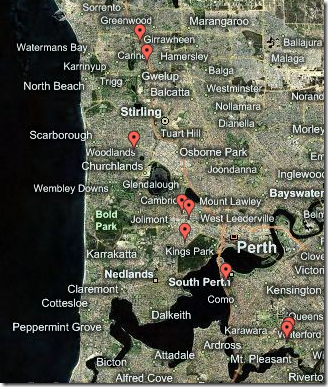
However, when I zoom in a long way, for example onto my workplace, there’s certainly a quite explicit level of geographic information:
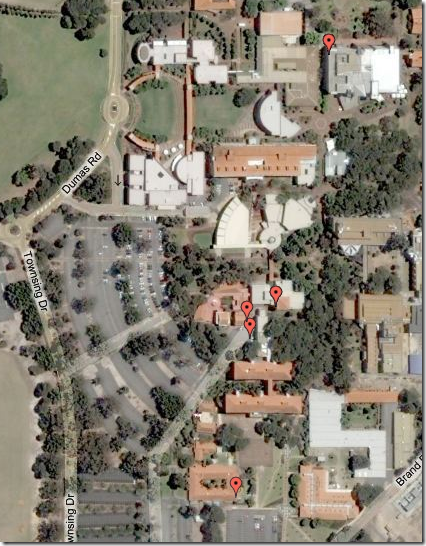
Now, I’m well aware of the data trail my Twitter, FourSquare and Flickr photos generate and acknowledge that if someone wanted to they could aggregate that information and build a reasonable picture of my activity. The point, though, is that many people aren’t that aware of the data trails they are leaving and that’s what Creepy purports to fix: it’s a very visible, confronting and explicit visualized map of the data trail you’re leaving. It’s not a technical privacy violation, but it might feel like an invasion of sorts. If it does feel that way, perhaps it’s time to think a little more about how, when and where you share information about yourself on social media and what data is actually embedded in your photos.


